Dan Coxon's Blog, page 3
November 26, 2019
New Publications for 2019
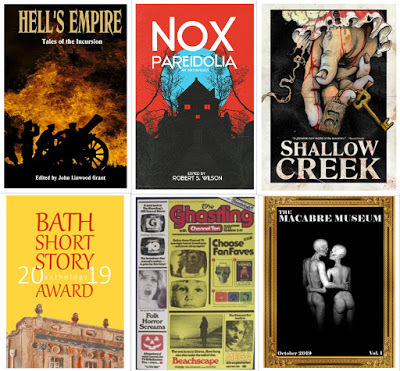 For a year when I was supposed to be taking things easy - at least on the fiction-writing front - I've had a surprising number of published stories. Obviously there's still a month to go until the end of the year, but so far in 2019 I've had a total of seven new stories published - making it one of my most prolific years to date. Of course, it helped that this Halloween offered a bumper crop, with three stories appearing in the week of All Hallows Eve alone. That's one of the perks of writing horror fiction, I guess.
For a year when I was supposed to be taking things easy - at least on the fiction-writing front - I've had a surprising number of published stories. Obviously there's still a month to go until the end of the year, but so far in 2019 I've had a total of seven new stories published - making it one of my most prolific years to date. Of course, it helped that this Halloween offered a bumper crop, with three stories appearing in the week of All Hallows Eve alone. That's one of the perks of writing horror fiction, I guess.Interestingly, the first two publications of the year were under my pen name, Ian Steadman.. The name was then retired, and I hit a bit of a fallow period - clearly I was in mourning. Some of the stories that came out in the second half of the year could easily have been Ian stories too, had he still been with us. If you're curious as to why I retired the pen name (or why I used it at all), you can read about it here.
My short story publications for 2019 are as follows. It goes without saying that I'd love for these to be nominated for any awards, should anybody see fit - but more importantly, I hope you find the time to read some of them. A story only truly comes to life when it finds a reader, so your job is just as important as mine.
The stories:
We Live in Dirt (as Ian Steadman)
This was published in Shallow Creek early in the year, an anthology from the fine folks at STORGY. Mushrooms, VHS tapes, a murder, and a whole truckload of weirdness.
The Sea Wall (as Ian Steadman)
A story in Hell's Empire, an anthology edited by John Linwood Grant and published by Ulthar Press. The remit was to bring the denizens of Hell to Victorian Britain - so where better to head than to the seaside?
After the Reservoir
A fairly short tale I'd been messing around with for a while, that finally found a home in BFS Horizons #9 (the journal of the British Fantasy Society). Partly influenced by Algernon Blackwood.
By Black Snow She Wept
Ever wanted to read an epistolary John Wyndham-influenced horror story set in the Old West? Well, here you go... This appeared in the debut issue of The Macabre Museum this October, just in time for Halloween.
Ones and Zeros
Another Halloween publication, this time in The Ghastling. Writing on the theme of 'the Number 10', what came out was an attempt at an unconventional haunting with foxes, binary code and the obligatory creaking floorboards.
Far From Home
I've been working on this story on and off for close to five years, so I was thrilled when it made an appearance in the excellent Nox Pareidolia anthology from Nightscape Press, alongside such fine writers as Laird Barron, Brian Evenson and Annie Neugebauer. Consider me starstruck.
Goya in the Deaf Man's House
My final publication of the year (probably). An award-shortlisted story from the Bath Short Story Award Anthology 2019 . Does what it says on the tin.
All in all, that's a respectable number of words this year. As for next year... I have two publications in the pipeline already, but who knows what else it will bring. Whatever it is, it will surely be odd, and uncanny, and maybe a little unsettling. Watch this space.
Published on November 26, 2019 07:01
May 23, 2019
Being Ian Steadman (Deceased)
 Hello. My name's Dan Coxon, and for the last two years I've been writing under a pen name.
Hello. My name's Dan Coxon, and for the last two years I've been writing under a pen name.Mind you, many of you already know that. The Ian Steadman nom de plume hasn't exactly been a secret. I've talked with numerous people about it, posted Steadman stories on Facebook and Twitter, even read 'as' Ian Steadman at FantasyCon (and elsewhere). For a while I even considered printing an 'I am the Real Ian Steadman' T-shirt.
So why bother? At its core, it was about separating what I perceived as two separate strands of my work. I've been writing 'literary' short fiction for a while, with several credits in well regarded magazines and anthologies; I also copy-edit literary novels (and local history, and biographies, and a host of other topics) for a number of publishers. On the flip side, I write weird horror fiction and uncanny ghost stories, some of which may feature gratuitous people-eating. It made sense, at least at the time, to keep the two separate. Let's be frank about it: I didn't want the weird stuff contaminating my more 'serious' work. That's how I saw it at the time, anyway.
I'll be the first to admit that I was wrong, and time has shown me why. Over the course of those two years, what I saw as two separate strands have come closer and closer together, so that they're now so entwined even I can't pick them apart. My copy-editing and proofreading work includes clients like Titan Books and Flame Tree Press, I'm now editor at Unsung Stories - all purveyors of the weird, the strange and the horrific. My writing is still sometimes clearly one thing or the other, but more often that not it's somewhere in between, straddling the literary and the horror camps.
Then there's the Shirley Jackson Awards nomination. As someone has already pointed out, it makes sense to 'cash in' (no actual cash involved) on the raised profile it brings. But more importantly, it showed me how false the division I'd imposed was. Here I am, nominated for an award for editing an anthology (the 'day job') that included both literary and horror stories, all under one strange banner. If I can break down boundaries between the genres when it came to other people's stories (and it's something I've explicitly tried to do with The Shadow Booth ), why the hell can't I do it with my own?
So, as of about... now, I'm retiring the Ian Steadman pen name. Ian is no more. This is an ex-Ian Steadman. The published stories will remain under his name, but you'll notice that they're all now included on my list of published works on this site. The last Steadman story was 'The Sea Wall', published earlier this week in Ulthar Press's Hell's Empire anthology - from here onwards, I'm me. Just me: editor, copy-editor, proofreader, writer.
Literary, horror, weird, and anything in between.
Published on May 23, 2019 12:42
May 3, 2019
Strange Wonders - Shirley Jackson Awards nomination
 I'm just going to come right out and say it: I'm absolutely thrilled that my anthology
This Dreaming Isle
been shortlisted for this year's Shirley Jackson Awards. (I considered phrasing this as some kind of humble brag, but for once my natural British modesty is taking the night off.) It's easy to shrug off awards nominations as little more than a lottery (bonus points for anyone who gets the Shirley Jackson reference there), but for those of us on the receiving end of nominations they mean more than that. For most of us, we spend hours... days... months slaving away on a project, often with little or no feedback, following little more than a trail of breadcrumbs through our own imagination. More often than not, that trail leads us to dead-ends and disappointments - so when it doesn't, it feels like a miracle.
I'm just going to come right out and say it: I'm absolutely thrilled that my anthology
This Dreaming Isle
been shortlisted for this year's Shirley Jackson Awards. (I considered phrasing this as some kind of humble brag, but for once my natural British modesty is taking the night off.) It's easy to shrug off awards nominations as little more than a lottery (bonus points for anyone who gets the Shirley Jackson reference there), but for those of us on the receiving end of nominations they mean more than that. For most of us, we spend hours... days... months slaving away on a project, often with little or no feedback, following little more than a trail of breadcrumbs through our own imagination. More often than not, that trail leads us to dead-ends and disappointments - so when it doesn't, it feels like a miracle.Some people read my book. They enjoyed it. I'm going to celebrate that.
Of course, this isn't just my book. More than almost any other writing project, anthologies are a group effort, everyone pulling together (hopefully, when it works) to create something more than we might have on our own. I truly believe that's the case with This Dreaming Isle - we have a wonderful bunch of authors, and the stories they've produced work perfectly side by side. Congratulations to all of you for getting us onto this shortlist.
It's also great to be on the list alongside such wonderful writers, and so many friends. Catriona Ward and Gary Budden both wrote a story for This Dreaming Isle, but they're here again in the Best Novel and Best Novella categories. Priya Sharma is here too, alongside two other nominations for Michael Kelly's wonderful Undertow Publications. If these are our peers, then we're in fine company.
In case you missed the announcement, here are those nominations in full:
NOVEL
Everything Under, Daisy Johnson (Jonathan Cape)
In the Night Wood, Dale Bailey (John Joseph Adams Books/Houghton Mifflin Harcourt)
Little Eve, Catriona Ward (Weidenfeld & Nicolson, an imprint of The Orion Publishing Group)
Social Creature, Tara Isabella Burton (Double Day/Raven Books)
We Sold Our Souls, Grady Hendrix (Quirk Books)
NOVELLA
Judderman, DA Northwood (Gary Budden) (Dead Ink Books/Cinder House Publishing)
The Atrocities, Jeremy C. Shipp (Tor.com)
The Only Harmless Great Thing, Brooke Bolander (Tor.com)
The Sea Dreams It Is the Sky, John Hornor Jacobs (HarperCollins Publishers)
The Taiga Syndrome, Cristina Rivera Garza (Dorothy, a Publishing Project)
NOVELETTE
“Adriftica,” Maria Dahvana Headley (Robots vs. Fairies)
“Blood and Smoke, Vinegar and Ashes,” D.P. Watt (The Silent Garden)
Ghostographs: An Album, Maria Romasco Moore (Rose Metal Press)
“Help the Witch,” Tom Cox (Help the Witch)
“The Black Sea,” Chris Mason (Beneath the Waves – Tales from the Deep, April 2018)
SHORT FICTION
“Back Seat,” Bracken MacLeod (Lost Highways)
“Hell,” David Hansen (The Charcoal Issue of Fairy Tale Review, March 2018)
“How to be a Horror Writer,” Tim Waggoner (Vastarien: A Literary Journal vol 1., issue 2 – Summer / Grimscribe Press)
“The Astronaut,” Christina Wood Martinez (Granta 142: Animalia)
“The Woman Dies,” Aoko Matsuda, translated from the Japanese by Polly Barton (online edition of Granta 144: genericlovestory)
SINGLE-AUTHOR COLLECTION
All the Fabulous Beasts, Priya Sharma (Undertow Publications)
From Deep Places, Gemma Files (Trepidatio Publishing)
Garden of Eldritch Delights, Lucy A. Snyder (Raw Dog Screaming Press)
Quartier Perdu, Sean O’Brien (Comma Press)
The Human Alchemy, Michael Griffin (Word Horde)
EDITED ANTHOLOGY
Chiral Mad 4: An Anthology of Collaborations, edited by Michael Bailey and Lucy A. Snyder (Written Backwards)
Robots vs Fairies, edited by Navah Wolfe and Dominik Parisien (Saga Press)
The Silent Garden: A Journal of Esoteric Fabulism, edited by The Silent Garden Collective (Undertow Publications)
This Dreaming Isle, edited by Dan Coxon (Unsung Stories)
Tiny Crimes: Very Short Tales of Mystery and Murder, edited by Lincoln Michel and Nadxieli Nieto (Black Balloon)
Finally, a footnote to the awards nomination. By coincidence, I also had a short article published today on the Ginger Nuts of Horror website about the challenges facing publishers of weird fiction. Michael Kelly from Undertow shares his thoughts with me, alongside Nicholas Royle (Nightjar) and Charles Dunphey (Gehenna & Hinnom). If you have any interest in the weird and the strange, from unsettling literary fiction to the great god Cthulhu himself, then please take a look. You can find it here.
Published on May 03, 2019 12:39
December 20, 2018
Living the Dream(ing Isle)
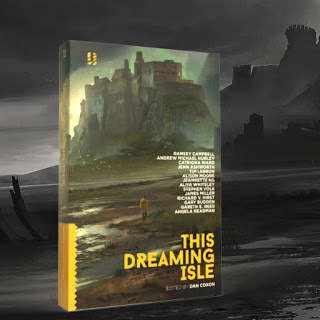 I'm thrilled to say that
This Dreaming Isle
, the anthology I edited and curated for Unsung Stories, is now out in the world. It's been a long, slightly laborious birth. Officially (pre-)launched at FantasyCon in Chester this October, the book wasn't actually sent out to shops and those all-important Kickstarter backers until December. Copies seem to be landing on doorsteps at last, though, and those shops that are stocking it seem to be doing well (Foyles on Charing Cross Road are doing a roaring trade!) It's also for sale via Amazon, and for the moment at least it's available on their Prime Same-Day service. The perfect last-minute gift for the reader in your family, perhaps?
I'm thrilled to say that
This Dreaming Isle
, the anthology I edited and curated for Unsung Stories, is now out in the world. It's been a long, slightly laborious birth. Officially (pre-)launched at FantasyCon in Chester this October, the book wasn't actually sent out to shops and those all-important Kickstarter backers until December. Copies seem to be landing on doorsteps at last, though, and those shops that are stocking it seem to be doing well (Foyles on Charing Cross Road are doing a roaring trade!) It's also for sale via Amazon, and for the moment at least it's available on their Prime Same-Day service. The perfect last-minute gift for the reader in your family, perhaps?As part of the book's publicity, I wrote a short piece for The Guardian outlining my Top 10 Folk Tales in Fiction (and plugging This Dreaming Isle shamelessly along the way). If you haven't already seen it, you can find my Top 10 Folk Tales in Fiction here. It's already generated plenty of discussion, so hopefully there are a few new gems to add to your bookshelves.
Reactions so far have been positive too. The book has had a glowing review from the guys at STORGY, saying: "it’s a celebration of fabulous writing, it’s an ingenious collection and concept, all of the writers turn in stunning works of eerie, creepy goodness and lastly it’s a celebration of the rich history we have here on our little island of storytellers, raconteurs, myths and folklore". Johnny Mains has also selected Jenn Ashworth's story 'Old Trash' for his Best British Horror 2019 anthology, and deservedly so.
Finally, we're hosting a special London launch event for the anthology on 15 January 2019 (not as far away as it sounds). It seemed pointless to hold a launch in the midst of the Christmas frenzy - but hopefully the idea of spending your January in the company of readers, writers, and maybe an impoverished editor or two will appeal. To help convince you, we have a stunning lineup for this event. There will be readings, discussion and signings by Robert Shearman, Kirsty Logan, Catriona Ward, James Miller, Gareth E. Rees, Aliya Whiteley and Gary Budden. The perfect opportunity to get your copy signed!
You can find full details of the This Dreaming Isle London launch event and RSVP here.
And that's all for 2018. If you do happen to read This Dreaming Isle, please leave a review on Goodreads or Amazon - we want to hear your thoughts! See you in 2019...
Published on December 20, 2018 02:28
September 19, 2018
Of Unsung Dreams & British Lore
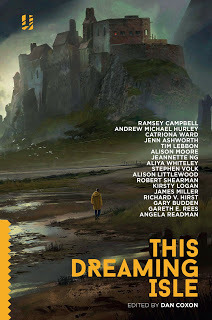 As is often the case with this blog, I'm writing this later than I originally intended. For the past four weeks I've been crowdfunding my latest anthology,
This Dreaming Isle
, with Unsung Stories over at Kickstarter. This blog piece was intended as a promotion for the book, but we're already close to the final whistle... in some cases, by the time you read this it may already be over. All too often, real life (and work) gets in the way.
As is often the case with this blog, I'm writing this later than I originally intended. For the past four weeks I've been crowdfunding my latest anthology,
This Dreaming Isle
, with Unsung Stories over at Kickstarter. This blog piece was intended as a promotion for the book, but we're already close to the final whistle... in some cases, by the time you read this it may already be over. All too often, real life (and work) gets in the way.If you do come to this later, you'll find This Dreaming Isle over at the Unsung Stories website. But if you catch it in time - please consider backing us on Kickstarter! If you read my blog, you'll already know my views on how great crowdfunding has been for anthologies.
This Dreaming Isle has already had a huge amount of interest, with Nina Allan kindly saying that it "may come to be seen as a landmark in the field". Then there's the stellar lineup we have, including horror legend Ramsey Campbell and Costa Award winner Andrew Michael Hurley.
Here's the blurb from the Kickstarter:
Britain has a long history of folk tales, ghost stories and other uncanny fictions, and these literary ley lines are still shimmering beneath the surface of this green and pleasant land. Every few generations this strangeness crawls out from the dark places of the British imagination, seeping into our art and culture. We are living through such a time.The full lineup is as follows:
This Dreaming Isle is an anthology of new horror stories and weird fiction with a distinctly British flavour, edited by Dan Coxon. It collects together seventeen brand new horrifying or unsettling stories that draw upon the landscape and history of the British Isles for their inspiration. Some explore the realms of myth and legend, others are firmly rooted in the present, engaging with the country’s forgotten spaces.
Catriona WardThe full Kickstarter campaign can be found here , including paperbacks, hardbacks and art prints of the cover - get ordering!
Jenn Ashworth
Andrew Michael Hurley
Tim Lebbon
Aliya Whiteley
Stephen Volk
Kirsty Logan
James Miller
Robert Shearman
Jeannette Ng
Richard V. Hirst
Gareth E. Rees
Alison Moore
Gary Budden
Alison Littlewood
Ramsey Campbell
Angela Readman
And while we're talking crowdfunded anthologies, my friends at Boudicca Press are also crowdfunding their first book, Disturbing the Beast - an anthology of weird fiction by women writers. This is such a great theme, with such a great cover, plus it has two wonderful writers already on board (Aliya Whiteley and Kirsty Logan), so show it your support. It's projects like this that are keeping the short story alive and healthy. Their Kickstarter page is here .
Finally, I'll leave you with this snippet from an interview I did with STORGY about the new anthology. You can read the full interview here .
I think I can safely say that all the writers in This Dreaming Isle avoid nostalgia and sentimentality about the past. Maybe that’s simply in the nature of folk horror: the past isn’t tea and scones on the lawn, it’s malicious ghosts and weird goings-on in the fells, it’s witches burned at the stake and towns razed to the ground by Vikings. The past is a dangerous, cutthroat place, filled with violence, injustice and inequality... Those who see it through rose-tinted glasses aren’t really engaging with it, they’re only fantasizing. And that’s always dangerous.
Published on September 19, 2018 03:38
March 27, 2018
Independence Daze: Indie Publishing and the Importance of Awards
 If you're part of the right circles on social media, you'll have noticed an increased buzz recently around the Saboteur Awards, and the Republic of Consciousness. Both seek - in very different ways - to recognise and reward independent publishers, magazines, writers and artists, the heroes who are working outside of the mainstream, and sometimes out of sight.
If you're part of the right circles on social media, you'll have noticed an increased buzz recently around the Saboteur Awards, and the Republic of Consciousness. Both seek - in very different ways - to recognise and reward independent publishers, magazines, writers and artists, the heroes who are working outside of the mainstream, and sometimes out of sight.There are those who will try to convince you that this is largely an exercise in self-congratulation, a small circle of people smugly patting each other on the back.
They are wrong.
Independent publishing has shown (yet again) in recent years that it's vital to the continuation of the literary novel, and short stories. Will Self may be sounding the death knell of the novel for the third or fourth time, but you only have to take a glance at the catalogue of Galley Beggar, say, or And Other Stories, so see that it's alive and well - it just isn't living in Random Penguin Towers. The novel isn't ill, but the publishing industry is. Choked with celebrity biographies, celebrity cookbooks - even ghostwritten celebrity 'novels' - it's a far cry from the industry's golden era. And as is always the case in times of scarcity, the really interesting work has gone underground.
That's not to say that it isn't popular. Eley Williams's Attrib., for example, has been widely reviewed and even more widely read, and was chosen by The Guardian's book club at the end of last year. It was a huge boost in the arm for the independent sector of the industry - and publishers Influx Press - when it won the Republic of Consciousness Award last week.
And that is, largely, the point. The Republic of Consciousness prize was set up specifically to reward the outstanding books that are finding publication through our indie presses, and Attrib. exemplifies this. It's successful, widely read, an excellent piece of work - and it's achieved all of that outside of the mainstream publishing system. Hopefully even more people will pick it up now that it's won an award.
Which brings us on to the Saboteur Awards. I know first-hand that these can make a huge difference, having won one with my anthology Being Dad back in 2016. Now the nominations are open for the awards once again, at least until the end of March - and I would wholeheartedly encourage you to make your nominations. This isn't just about rewarding good work - it's about making that work even more visible, and celebrating the gems that still manage to shine, even without the big budgets and national marketing campaigns of those Random Penguins.
Of course, I have a couple of horses in the race myself. I'd be hugely grateful if you'd consider nominating The Shadow Booth: Vol. 1 for Best Anthology, or The Lonely Crowd for Best Magazine. But even if you don't, you should visit the Saboteur Awards site and make your nominations. There's plenty of great work out there to choose from - including Attrib., but also debut collections by Gary Budden and Malcolm Devlin, or live events like Unsung Live, or 'wildcards' like the Paperchain Podcast... or, in fact, anything that you think deserves the recognition.
In an industry that doesn't always reward the small projects, this is your chance to make a difference. You have until 31 March. Show your love.
Published on March 27, 2018 13:17
November 4, 2017
Embracing the Strange
 If you've been paying attention to my Twitter and Facebook feeds, you'll know that I've recently launched (and successfully crowdfunded) a new literary journal. The Shadow Booth will be making its first appearance this December, as a full-length (200-page) mass market paperback of weird and eerie fiction partly inspired by the old Pan Books of Horror.
If you've been paying attention to my Twitter and Facebook feeds, you'll know that I've recently launched (and successfully crowdfunded) a new literary journal. The Shadow Booth will be making its first appearance this December, as a full-length (200-page) mass market paperback of weird and eerie fiction partly inspired by the old Pan Books of Horror.I'll be adding details on how to order it to this page in the near future (although some of you might already have pre-ordered, via our Kickstarter - in which case, thank you!). In the meantime, I wanted to share some of the essays and interviews I've done to promote it. Hopefully they'll go some way towards explaining why I've decided to launch it, why I'm attracted to the weird and the eerie - and what exactly those terms mean.
Here are some links to the key pieces:
Face the Strange: A Case for the Weird and the Eerie on the Ginger Nuts of Horror website.
Everything is Weird These Days on the STORGY website
Lessons in Launching a Literary Journal on the TSS Publishing website
Inside The Shadow Booth - interview on the Gehenna & Hinnom website
Crowdfunding Literature - interview on the ZeroFlash website
There, that wasn't so strange - was it?
Published on November 04, 2017 02:42
April 9, 2017
Found in the Crowd: the Case for Crowdfunding Anthologies
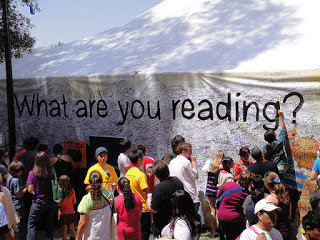 Photo by The Conmunity
Photo by The Conmunity(https://www.flickr.com/photos/popcult...)
Recently, in certain literary circles, there’s been a lot of chatter about the future of the short story. Some feel that we’re seeing a resurgence of the short form, citing the phenomenal success of George Saunders as proof. Others feel that the popularity of stories has steadily declined in recent years. In his generally positive introduction to The Penguin Book of the British Short Story, even Philip Hensher was forced to admit that ‘reading short stories rewarded by competitions, I was struck by present-tense solitary reflections, often with characters lying on their beds affectlessly pondering… There was nothing there at all, apart from a fervent desire to win £30,000.’
What everyone appears to agree on is the fact that publishers don’t know what to do with short stories. Occasionally the larger publishers will humour an established author – Hilary Mantel, Lionel Shriver – by allowing them a collection between the novels, but you’re unlikely to see many debuts. New authors are finding that only the smaller, independent presses are willing to take a punt on their genius.
The same is also true of anthologies, as I found myself, when I edited Being Dad: Short Stories About Fatherhood last year – but thankfully, help may be on the way. More and more publishers seem to be turning to crowdfunding as a viable option, and in particular it’s something that seems to be working for the humble anthology. Might there be a future for the short story after all?
In many ways, my experience with Being Dad was fairly typical. Several medium-to-large publishers expressed an interest, but said that anthologies ‘didn’t sell’ (how they would know this when they don’t actually publish any is one of life’s great mysteries). Eventually I secured the interest of Bristol-based Tangent Books, who had the foresight to see that this was a book which had both a market and some great stories. There was one proviso: we had to raise the initial costs via crowdfunding.
I’ll admit, at first I was reluctant – but when it came to the crunch there were few options. I also liked Tangent’s enthusiasm for the project, and the way they conducted their business. I therefore launched a campaign on Kickstarter to raise the necessary capital to get the book off the ground.
I won’t go into the details here, but suffice it to say that it was a long and arduous process. What struck me most forcibly, however, was the interest we were receiving – and not just from people we knew. Yes, many of my friends and family backed the book, for which I’m hugely grateful. But we received pledges from complete strangers too – some of them extremely generous – and in the final accounting these made up more than half the total. We were able to pre-sell much of the first print run in this way, and the project very quickly went into profit.
My experience is by no means unique, either. Unsung Stories are currently crowdfunding 2084 , an anthology of short stories inspired by George Orwell’s Nineteen Eighty-Four, and they’ve had a resounding success. Their funding goal was reached within eleven hours of the campaign launching, and they’re now up to over £8000 as I write this, more than three times their original goal.
I asked George Sandison at Unsung Stories why they’d decided to crowdfund the book, and this is what he had to say:
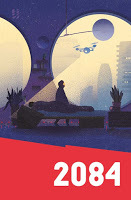
‘One of the things an anthology gives you, that a single-author book doesn't, is a chance to reach the fans of every author involved. Between support from contributors with promoting the launch, and a larger group of people who may be interested in the project, you've got a healthy customer base to call on. And one of the things crowdfunding does really well, is get people involved in a project - they get their name in the book, collectible editions, artwork, special stuff they'll want to keep. So combine those two things and you have a lot of people, who are empowered and made part of the process. Quite literally, they help make the book.’
This is what I’d found too, and it suggests that there’s a very real business model that’s starting to emerge. Anthologies benefit from having several authors involved, with their combined fan bases – they are also able to spread their appeal more widely. Having one or two well-established authors on board can also make it more appealing, especially to an audience that might not have taken a chance on the lesser-known writers.
Of course, it’s not just anthologies that are reaping the benefits of crowdfunding. Independent presses in general are gradually coming to realise its advantages, and many now have a success story to tell. Influx Press recently crowdfunded their own anthology, The Unreliable Guide to London, which has gone on to receive critical acclaim (it’s currently shortlisted for Best Anthology at this year’s Saboteur Awards , an accolade that I’m proud to say went to Being Dad last year). At the moment, they’re undertaking a more general crowdfunding project, however, raising funds to support the business’s growth . This campaign is already enjoying phenomenal success, and is well worth checking out. Dead Ink and Dodo Ink have also turned to crowdfunding to get projects off the ground in recent years, and all are going from strength to strength.
Interestingly, Unbound enjoyed a huge crowdfunded success with Nikesh Shukla’s The Good Immigrant last year too. While this was non-fiction, rather than fiction, it once again suggested that crowdfunding works for multi-author projects. I’ve since been told that Unbound will no longer consider anthologies, a decision that seems to undermine the idea of crowdfunding anthologies as a strong business model. It starts to make sense, however, when you bear in mind that Unbound are now part of the Penguin Random House behemoth. Clearly the mainstream publishing mantra that ‘anthologies don’t sell’ has already seeped through to the Unbounders.
Within the independent field, though, the anthology may actually be thriving, and crowdfunding is looking more and more like the way forward. Yes, short stories are a niche market – but they’re a market nonetheless. By targeting and actively involving readers who have an interest in short fiction, projects like Unsung’s 2084 are looking remarkably prescient, a glimpse into what the future might hold for anthologists everywhere. Publishers would do well to look to crowdfunding when they’re considering turning an anthology down. The market is still out there – you just have to search for it in the crowd.
Published on April 09, 2017 02:19
December 17, 2016
2016: A Year of Reading
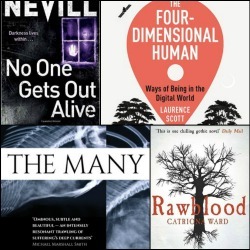 According to my Goodreads stats (and I have no reason to doubt them), I'll have read 60 books this year, for a total of around 16,000 pages. That's a fairly hefty number of words whichever way you look at it, and there have been untold highlights among them. (Incidentally, this doesn't include books that I've read as part of my editing and proofreading workload. Add those and it's closer to 20,000 pages.)
According to my Goodreads stats (and I have no reason to doubt them), I'll have read 60 books this year, for a total of around 16,000 pages. That's a fairly hefty number of words whichever way you look at it, and there have been untold highlights among them. (Incidentally, this doesn't include books that I've read as part of my editing and proofreading workload. Add those and it's closer to 20,000 pages.)I was tempted to write a 'Best Books of 2016' list, just like everyone else - but it would be a lie. Despite those impressive stats, there's no way I've read enough of this year's output to judge which books deserve to rise to the top of the pile.
So, instead, here's my Top Ten books I've read this year. Some are new, some are old - but all were wonderful. (Note: My reading has taken a rather horrific turn this year. If you're not up for a little horror and weird fiction in the mix, turn away now...)
1. Wyl Menmuir - The Many - One from the Booker longlist that definitely should have made the shortlist. Brief, dark, and strangely haunting.
2. Aliya Whiteley - The Beauty - Should have read this a long time ago, but glad I finally got there. Fungal horror.
3. T. H. White - The Goshawk - A classic tale of one man and his incompetent attempts to tame nature. Still brilliant.
4. Adam Nevill - No One Gets Out Alive - Genuinely creepy amalgam of supernatural horror and serial killer thrills. Deeply unsettling.
5. Alison Moore - Death and the Seaside - Weird, wordy, but fascinating from start to finish. I love Alison Moore's short fiction, and I loved this.
6. Catriona Ward - Rawblood - The newcomer on the horror block, Catriona Ward has created a spellbinding take on classic Gothic horror, with a killer twist.
7. Laurence Scott - The Four-Dimensional Human - One of only two non-fiction books on the list, this is the most clear-sighted account I've read of living in the digital world.
8. Andrew Michael Hurley - The Loney - Yes, yes, I came to this late... but better late than never. A potential game-changer, as horror enters the literary mainstream.
9. Benjamin Myers - Beastings - I was late to this one too, but its combination of Cumbrian grit and Cormac McCarthy-esque brutality had me gripped.
10. Michael McCarthy - The Moth Snowstorm - The other non-fiction book, about British wildlife, how we're destroying it, and why it's important to our mental well-being. Vital stuff.
And yes, I did read the Man Booker winner. And no, it didn't quite make the list...
Published on December 17, 2016 13:18
November 24, 2016
Going Freelance - Editing, Proofreading & more
 You'll notice that I've been quiet on here recently. I've been busy. Since April I've been setting up
Momus Editorial
, my freelance editing, copy-editing and proofreading business.
You'll notice that I've been quiet on here recently. I've been busy. Since April I've been setting up
Momus Editorial
, my freelance editing, copy-editing and proofreading business.I'm pleased to say that things have gone well over the last seven months. At first there was much biting of nails as I sat hunched over my laptop, desperately hoping for some work to come in... but the workflow has been steady for two months or more now, and I'm booked up until mid-December. It's been nerve-wracking (and time-consuming) to set up a small business, but I finally feel like I'm there. In less that six months I've progressed from Basic Member of the SfEP (The Society for Editors and Proofreaders) to Intermediate Member, and I've undertaken training to make sure that my edits are up to the industry standard. As with any discipline, there's still plenty to learn - but I can edit and proofread now with confidence.
I've also had the opportunity to work on some great books. I've taken on publishers and private individuals as clients, and have been amazed at how each manuscript brings its own unique challenges. I've worked on two excellent books for Dodo Ink ( Dodge & Burn by Seraphina Madsen and The Eleventh Letter by Tom Tomaszewski, both available now), and forthcoming titles from Unsung Stories and Influx Press ( Pseudotooth by Verity Holloway and Signal Failure: London to Birmingham, HS2 on Foot by Tom Jefferys). All have been great reads, and a joy to work on.
All of which means that Momus Editorial is now definitely open for business, and I'm actively looking for more clients. If you're a small publisher looking for a proofreader, or a writer who wants to polish his or her manuscript before sending it out (or self-publishing), then get in touch. You can contact me direct at dan@momuseditorial.co.uk, or find me on Twitter at @DanCoxonAuthor and @MomusEditorial. I hope to start editing your manuscripts someday soon...
(By the way, all this editorial work doesn't mean that my own writing has stopped. There's more coming before the end of the year, and into next year - so watch this space!)
Published on November 24, 2016 02:54



